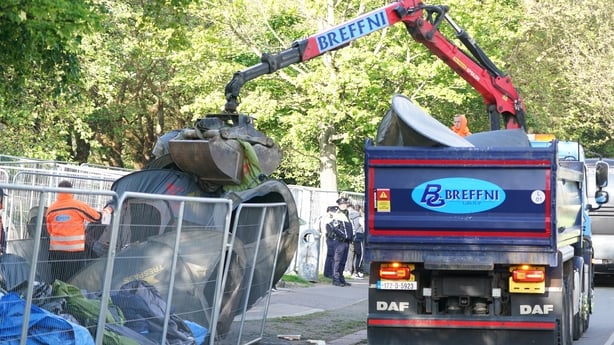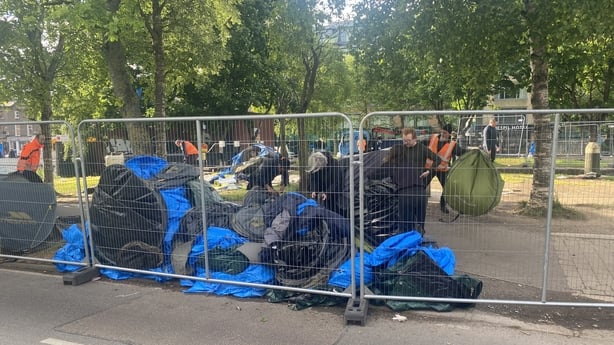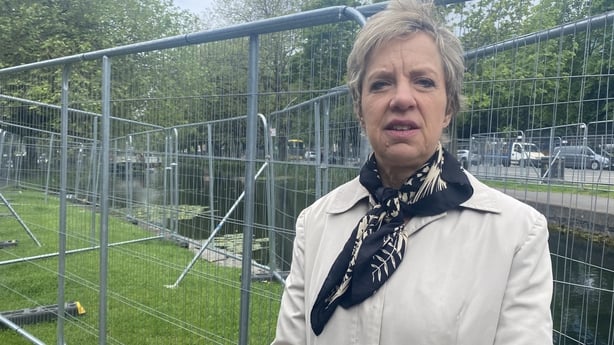Around 100 tents used by asylum seekers were removed from Dublin's Grand Canal, the third such operation at the canal this month.
This comes after previous multi-agency responses to remove tents from around the city.
In total, 109 individuals were offered accommodation this morning.
Contractors began erecting additional barriers around the site from 5am, while the operation began at around 6.30am.
The tents were loaded onto a lorry while volunteers sifted through people's belongings and took away the blue tarpaulins that covered the tents in the encampment, close to the Baggot Street Bridge along the Grand Canal.
We need your consent to load this rte-player contentWe use rte-player to manage extra content that can set cookies on your device and collect data about your activity. Please review their details and accept them to load the content.Manage Preferences
The asylum seekers have been given a letter telling them they are committing an offence if they continue to stay on canal property.
Five buses carrying the men left shortly before 8am and fresh barriers are being erected along the canal.
A Government statement this morning said that a number of beds became available in Citywest in recent days, which resulted in offers of accommodation being made to International Protection applicants awaiting accommodation.
Tents along grand canal being removed now. Buses waiting to take occupants to alternative accommodation. pic.twitter.com/iIlbaiNFcL
— Carole Coleman (@Carolecoleman) May 30, 2024
"The Department of Children, Equality, Disability, Integration and Youth, with the support of a number of homeless charities, conducted outreach visits at the Grand Canal," the statement added.
"Any individual identified as eligible for International Protection accommodation at one or more of those outreach visits was offered accommodation at Citywest."
Taoiseach Simon Harris said he wanted to thank the "many State agencies who are now working closely together on the issue of immigration".
"I have been very clear that we cannot have a siloed approach to migration. All agencies must work together to deliver a comprehensive response," he said.

Mr Harris said that this morning's work at the canal is an example of all agencies working together, but added that shelter and accommodation is only one aspect of migration policy.
"Irish people are compassionate, they are also full of common sense. Both elements must always be demonstrated by Government too," he said.
'Canal not the only place where homeless asylum seekers are sleeping'
Volunteers working with International Protection Applicants say many more men, including new arrivals are without accommodation this evening.
There has so far been no return of any large-scale encampment on the Grand Canal but some are sleeping in tents across the city and near mosques and churches.
One volunteer, Olivia Headon says anyone who was not at their tent at the Grand Canal this morning when the operation took place, had not been offered accommodation, including one man who had been sleeping there on a regular basis and made his own way to CityWest.
She said the canal was not the only place where homeless asylum seekers are sleeping "so if you're only doing outreach to one place, then you're definitely going to miss people".
The IPAS office was relatively quiet this afternoon with barriers around streets there as well as along the Grand Canal, remaining in place.
The latest figures show there are 1,939 applicants awaiting an offer of accommodation.
This is the fifth time asylum seekers sleeping in tents have been moved from parts of Dublin city in recent months, twice at the International Protection Office on Mount Street and three times along the Grand Canal.

Hundreds of applicants have been offered State-provided shelter through the operations.
Asked if the coalition was pursuing a tougher approach to migrants by moving tents from the canal area in Dublin, Environment Minister Eamon Ryan said people seeking refuge had to be treated with respect since many had been coming from "deeply fraught and traumatised situations."
He said an encampment on the canal was not safe or healthy.
"Our job is to make sure we have those alternative facilities. That's been really challenging, because over 120,000 people came into the country in a short period. So, scaling that up - we’ll do that."
Labour leader Ivana Bacik said the men had been sleeping in cramped and unsanitary conditions in a situation which had become "untenable."
"All that we're seeing is a series of stop-gap measures from Government and no sustainable, coherent plan for the accommodation of those who come here seeking refuge.

"We know there are many more still without shelter, still without State accommodation, we know there's a case ongoing on this very issue and we know that the Government simply must now step up".
She said the Government needed to provide the six large-scale reception and integration centres that their own expert group had recommended "to ensure that people are not left sleeping on canals, in public spaces, public roads."
She said the fencing off of canal sides and public spaces and "a series of desperate, last-ditch efforts to provide people with accommodation on a short-term basis, this is not the way to manage immigration policy."
The Government is operating State-provided shelter at multiple sites where it says it has robust, weather-proof tents.
It has said that the sites also have toilets and showers; health services; indoor areas where food is provided; facilities to charge phones and personal devices; access to transport to and from Dublin City Centre; and 24-hour onsite security.
One young man who was offered State-provided accommodation this morning said he was fleeing conflict in Somalia.
He added that he has been awaiting an offer of accommodation in Ireland since February.
Speaking to the PA news agency, he said that men at the camp were fleeing conflict.
He also said he believes the move to State-provided shelter is good as there is no access to facilities at the makeshift camp.
He further expressed concern about "misinformation and propaganda" being spread about the men online and in the media.
Additional reporting: Carole Coleman, Tony Connelly, PA






